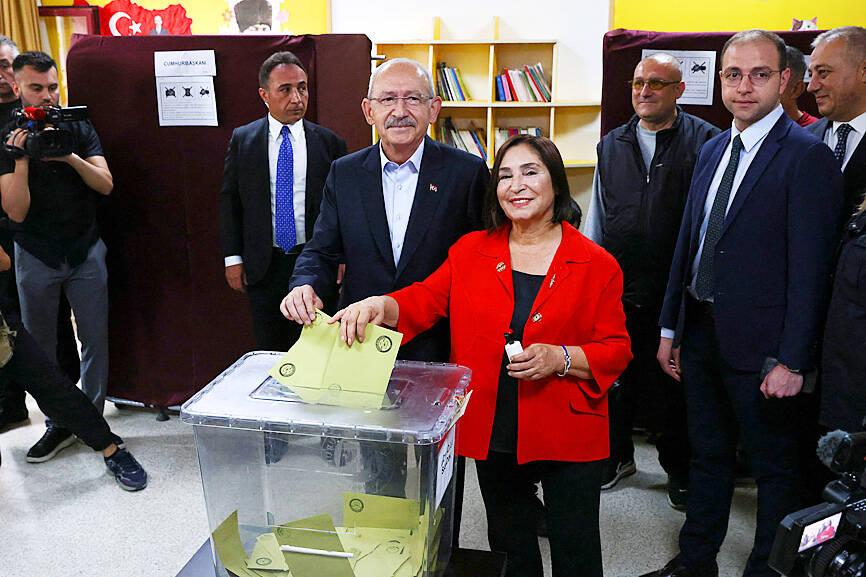Turks were voting yesterday in a presidential runoff that could see Turkish President Rcep Tayyip Erdogan extend his rule into a third decade and persist with Turkey’s increasingly authoritarian path, muscular foreign policy and unorthodox economic governance.
Erdogan, 69, defied opinion polls and came out comfortably ahead with an almost five-point lead over his rival Kemal Kilicdaroglu in the first round on May 14.
However, he fell just short of the 50 percent needed to avoid a runoff, in a race with profound consequences for Turkey itself and global geopolitics.

Photo: Reuters
His unexpectedly strong showing amid a deep cost-of-living crisis and a win in parliamentary elections for a coalition of his Islamist-rooted Justice and Development Party, the Nationalist Movement Party and others, buoyed the veteran campaigner who says a vote for him is a vote for stability.
The election would decide not only who leads Turkey, a NATO-member country of 85 million, but also how it is governed, where its economy is headed after its currency plunged to one-10th of its value against the US dollar in a decade, and the shape of its foreign policy, which has seen Turkey irk the West by cultivating ties with Russia and Persian Gulf states.
In the city of Diyarbakir in the mainly Kurdish southeast, retiree Faruk Gecgel, 54, said he voted for Erdogan as he did two weeks ago.
“It is important for Turkey’s future that the president and parliament, where he has a majority, work together under the same roof. So I voted for Erdogan again for stability,” he said.
Housewife Canan Tince, 34, said she voted for Kilicdaroglu, who on May 14 received nearly 72 percent support in the city — a stronghold of the main pro-Kurdish opposition party.
“Enough is enough. Change is essential to overcome the economic crisis and problems that Turkey faces, so I voted for Kilicdaroglu again. We are hopeful and determined,” she said.
Kilicdaroglu, 74, is the candidate of a six-party opposition alliance, and leads the Republican People’s Party created by Turkey’s founder Mustafa Kemal Ataturk. His camp has struggled to regain momentum after the shock of trailing Erdogan in the first round.
The initial election showed larger-than-expected support for nationalism — a powerful force in Turkish politics which has been hardened by years of hostilities with Kurdish militants, an attempted coup in 2016 and the influx of millions of refugees from Syria since civil war began there in 2011.
Turkey is the world’s largest host of refugees, with about 5 million migrants, of whom 3.3 million are Syrians, according to Turkish Ministry of the Interior data.
Third-place presidential candidate and hardline nationalist Sinan Ogan said he endorsed Erdogan based on a principle of “non-stop struggle [against] terrorism,” referring to pro-Kurdish groups.

Kehinde Sanni spends his days smoothing out dents and repainting scratched bumpers in a modest autobody shop in Lagos. He has never left Nigeria, yet he speaks glowingly of Burkina Faso military leader Ibrahim Traore. “Nigeria needs someone like Ibrahim Traore of Burkina Faso. He is doing well for his country,” Sanni said. His admiration is shaped by a steady stream of viral videos, memes and social media posts — many misleading or outright false — portraying Traore as a fearless reformer who defied Western powers and reclaimed his country’s dignity. The Burkinabe strongman swept into power following a coup in September 2022

‘FRAGMENTING’: British politics have for a long time been dominated by the Labor Party and the Tories, but polls suggest that Reform now poses a significant challenge Hard-right upstarts Reform UK snatched a parliamentary seat from British Prime Minister Keir Starmer’s Labor Party yesterday in local elections that dealt a blow to the UK’s two establishment parties. Reform, led by anti-immigrant firebrand Nigel Farage, won the by-election in Runcorn and Helsby in northwest England by just six votes, as it picked up gains in other localities, including one mayoralty. The group’s strong showing continues momentum it built up at last year’s general election and appears to confirm a trend that the UK is entering an era of multi-party politics. “For the movement, for the party it’s a very, very big

ENTERTAINMENT: Rio officials have a history of organizing massive concerts on Copacabana Beach, with Madonna’s show drawing about 1.6 million fans last year Lady Gaga on Saturday night gave a free concert in front of 2 million fans who poured onto Copacabana Beach in Rio de Janeiro for the biggest show of her career. “Tonight, we’re making history... Thank you for making history with me,” Lady Gaga told a screaming crowd. The Mother Monster, as she is known, started the show at about 10:10pm local time with her 2011 song Bloody Mary. Cries of joy rose from the tightly packed fans who sang and danced shoulder-to-shoulder on the vast stretch of sand. Concert organizers said 2.1 million people attended the show. Lady Gaga

SUPPORT: The Australian prime minister promised to back Kyiv against Russia’s invasion, saying: ‘That’s my government’s position. It was yesterday. It still is’ Left-leaning Australian Prime Minister Anthony Albanese yesterday basked in his landslide election win, promising a “disciplined, orderly” government to confront cost-of-living pain and tariff turmoil. People clapped as the 62-year-old and his fiancee, Jodie Haydon, who visited his old inner Sydney haunt, Cafe Italia, surrounded by a crowd of jostling photographers and journalists. Albanese’s Labor Party is on course to win at least 83 seats in the 150-member parliament, partial results showed. Opposition leader Peter Dutton’s conservative Liberal-National coalition had just 38 seats, and other parties 12. Another 17 seats were still in doubt. “We will be a disciplined, orderly